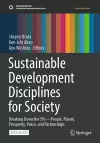
Sustainable Development Disciplines for Society
3 contributors - Paperback
£34.99
Find out more
Shujiro Urata
Dr. Shujiro Urata is Professor Emeritus at Waseda University, formerly Professor of International Economics at the Graduate School Asia-Pacific Studies, Waseda University. He currently holds positions as Senior Research Advisor, Economic Research Institute for ASEAN and East Asia (ERIA); Faculty Fellow at the Research Institute of Economy, Trade, and Industry (RIETI); Specially Appointed Fellow at the Japanese Centre for Economic Research (JCER); Visiting Fellow, Asian Development Bank Institute (ADBI); and Distinguished Senior Fellow at the Institute of Developing Economies (IDE-JETRO). Professor Urata received his B.A. in Economics from Keio University and MA and Ph.D. in Economics from Stanford University. He is a former Research Associate at the Brookings Institution and Economist at the World Bank. He specializes in international economics and has published a number of books and articles on international economic issues. His recent books include Achieving Inclusive Growth in the Asia Pacific, co-editor, Australian National University Press, 2020; Enhancing SME Participation in Global Value Chains, editor, Asian Development Bank Institute, 2021; The Effect of Globalisation on Firm and Labour Performance, co-editor, Routledge, 2021; and Globalization and Its Economic Consequences: Looking at APEC Economies, co-editor, Routledge, 2021.Ken-Ichi Akao
Dr. Ken-Ichi Akao is a professor of environmental economics in the Faculty of Social Sciences, Waseda University. He received his B.S., M.S., and Ph.D. in Agricultural Sciences from Kyoto University. He joined Waseda University in 1995.Akao’s research interests include sustainable development, the tragedy of the commons, environmental policies, and international environmental agreements. His works apply nonlinear dynamic theory to economic analysis and environmental issues. Selected publications include: Tax schemes in a class of differential games (Economic Theory, 2008), Some rationalizability results for dynamic games (with Tapan Mitra and Gerhard Sorger, International Journal of Economic Theory, 2012), A tradable permit system in an intertemporal economy (with Shunsuke Managi, Environmental and Resource Economics, 2013), and A Theory of Disasters and Long-run Growth (with Hiroaki Sakamoto, Journal of Economic Dynamics and Control, 2018). He serves as a co-editor of the academic journal, Environmental Economics and Policy Studies, Springer (the Editor-in-Chief, 2014-18); an editor of the International Review of Environmental and Resource Economics, now publishers; and an editorial board member of the Chinese Journal of Population Resources and Environment, KeAi. He was the President of the Society for Environmental Economics and Policy Studies from 2016 to 2018.Ayu Washizu
Dr. Ayu Washizu is a Professor at the School of Social Sciences, Director of the Institute for Economic Analysis of Next-generation Science and Technology, and Vice Director of the Research Institute for Environment Economics and Management at Waseda University in Tokyo. Her research interests include input-output analysis, renewable energy, and smart society utilizing information communication technology. She has published her research in academic journals such as Cities, Renewable and Sustainable Energy Reviews, Journal of Environmental Management, Telecommunications Policy, Environmental Economics and Policy Studies, Journalof the Japan Institute of Energy, and Economic Systems Research. Dr. Washizu holds a Ph.D. in commerce, an MSc in economics, and a B.A. in economics from Keio University. She has served on a number of Japanese local government committees on public works, including the Public Works Evaluation Committee of the City of Yokohama and the Port Council of the City of Kawasaki. She has also served on the editorial boards of academic journals such as Energy and Resources. In 2010, she was awarded the Best Presentation Paper Award at the 4th International Symposium on Environmentally Conscious Design and Inverse Manufacturing EcoDesign (2005) and the Outstanding Paper Award from the Japan Society of Material Cycles and Waste Management (2010).